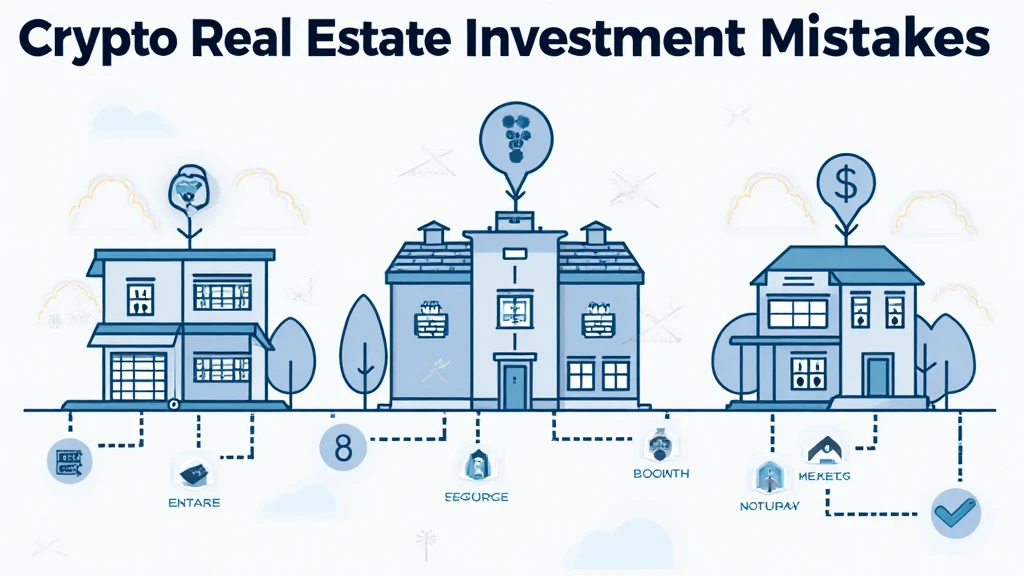Top 10 Crypto Real Estate Mistakes
With recent data showing that $4.1 billion was lost to various hacks and vulnerabilities in DeFi platforms just last year, the need for informed decision-making in the crypto real estate sector has never been more critical. The intersection of blockchain technology and real estate presents innovative opportunities, yet it also brings unique challenges. This article aims to highlight the top 10 mistakes investors make in crypto real estate and how you can avoid them. Whether you’re looking to dive into this evolving market or already have investments, understanding these pitfalls will enhance your success in the crypto real estate landscape.
Mistake #1: Ignoring Due Diligence
Many investors jump into crypto real estate transactions without conducting thorough research. Much like evaluating a physical property, digital assets require scrutiny. It’s essential to verify the legitimacy of the project, its team, and its financial health.
- Check the project’s whitepaper for comprehensive details.
- Review the team’s track records and expert credentials.
- Analyze community feedback on platforms like Reddit or LinkedIn.
Missing out on these checks can lead to investing in scams, resulting in significant financial losses.

Mistake #2: Overlooking Security Measures
In the digital age, cybersecurity is a significant concern. The real estate sector, when tied to blockchain, isn’t immune to threats. Investors often underestimate the necessity of implementing robust security protocols, similar to securing traditional assets.
- Use wallet options that offer multi-signature features.
- Regularly update software to patch vulnerabilities.
- Employ two-factor authentication wherever possible.
According to recent reports, enhanced security methods can reduce hacks by over 70%, providing better peace of mind.
Mistake #3: Not Understanding Market Dynamics
It’s critical to recognize that the crypto real estate market mirrors traditional markets in many ways. Fluctuations in crypto can severely impact property values. Investors should monitor:
- The market trends of key cryptocurrencies.
- Regulatory changes affecting digital assets.
- Emerging technologies like NFTs that influence ownership models.
By staying informed, investors can make timely decisions that align with market conditions, avoiding substantial losses.
Mistake #4: Misunderstanding Token Economics
The financial dynamics surrounding cryptocurrencies, known as tokenomics, are crucial for investing in crypto real estate. Here’s what to look out for:
- Understand the supply and demand mechanics. More supply than demand can depress prices.
- Analyze the utility of the token in the project. Does it facilitate transactions or provide other benefits?
- Monitor the distribution of tokens. Over-concentration can lead to market manipulation.
Failing to grasp these concepts can result in miscalculations regarding property valuations.
Mistake #5: Overestimating Returns
Optimism often clouds judgment, leading investors to overestimate potential returns from crypto real estate investments. Unlike traditional assets, the volatility in crypto can lead to unexpected downturns. It’s essential to adopt a realistic outlook and consider:
- Set conservative return expectations based on market data.
- Diversify your investment portfolio to mitigate risks.
- Stay informed about potential regulatory impacts on your investments.
Relying on moderated expectations can help in formulating a sustainable investment strategy.
Mistake #6: Skipping Legal Consultation
Real estate transactions typically involve intricate legal implications, which carry over to the crypto realm. Engaging with legal professionals who specialize in crypto transactions is crucial to ensure compliance and protect your investments.
- Consult legal experts to navigate regulatory frameworks.
- Ensure proper documentation of transactions and ownership rights.
- Stay updated on laws surrounding crypto and digital real estate.
Neglecting this step can lead to costly legal disputes down the line.
Mistake #7: Ignoring Local Laws and Regulations
Understanding the legal landscape in the specific region you’re investing is vital. Laws surrounding crypto real estate and digital assets can vary greatly, so avoid overlooking local regulations that could affect your investment.
- Research property laws that apply to digital assets in your country.
- Identify any taxation obligations associated with the purchase or sale of digital real estate.
- Consult with local governance to clarify any ambiguities.
The oversight can lead to substantial fines or forfeiture of assets.
Mistake #8: Failing to Network
Connections in the crypto space can unlock numerous opportunities yet can be overlooked. Networking can provide valuable insights into market trends, investment strategies, and potential projects. Here’s how to leverage it:
- Attend industry conferences and webinars to meet key players.
- Engage with online forums and communities actively.
- Share and gather insights on platforms like LinkedIn.
Building a diverse network opens doors and creates avenues for collaboration.
Mistake #9: Lack of Exit Strategy
Investors often neglect to formulate an exit strategy before diving into investments, leaving them unprepared for downturns. It’s crucial to define an exit plan to ensure you can recoup your investments when necessary. Here’s a quick checklist:
- Identify your target ROI and establish profit-taking points.
- Evaluate the optimal time to sell based on the market conditions.
- Consider setting stop-loss orders to automate sell thresholds.
Having an exit strategy gives you a safety net in uncertain times.
Mistake #10: Failing to Keep Up with Technology Trends
Technology in the crypto space evolves at a rapid pace. Investors who resist or fail to adapt to new trends risk falling behind. Staying ahead in the game involves:
- Regularly educating yourself on blockchain advancements and their applications.
- Exploring innovative property management solutions influenced by blockchain tech.
- Adopting tools that enhance security and transaction efficiency.
By embracing change, investors can harness new technologies for improved investment strategies.
Conclusion
In conclusion, the world of crypto real estate is rife with opportunities, yet it also presents unique challenges that can lead to catastrophic mistakes if not properly navigated. From conducting due diligence to understanding token dynamics, each component plays a pivotal role in securing a successful investment venture. It’s essential to acknowledge that investing in digital assets, akin to physical properties, warrants caution and strategic planning. Adhering to the outlined strategies can save you from costly errors and lead to fruitful outcomes. As you move forward in your crypto real estate journey, stay informed, engaged, and most importantly, avoid these common pitfalls.
For more insights about crypto investments and real estate, visit hibt.com for expert guidance.




